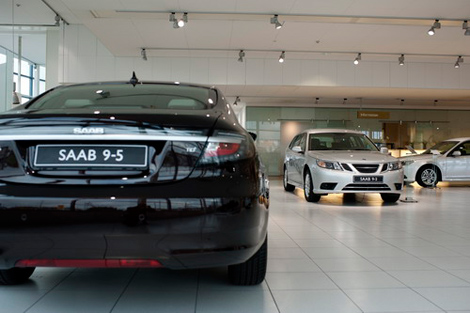Saab banking on Chinese lender
Updated: 2011-12-06 10:50
By Li Fangfang (China Daily)
|
|||||||||||
|
Chinese companies already have a hand in Saab Automobile AB vehicles. In December 2009, Beijing Automotive Industry Holdings Co Ltd, China's fifth-largest automaker, took over production equipment and intellectual property rights to two older Saab models - the 9-5 and 9-3 - including powertrain technology and tooling.?[Photo / Bloomberg]
|
Car maker in negotiations about equity interest with unnamed bank
BEIJING - Swedish Automobile NV (Swan), the Dutch owner of the car maker Saab Automobile AB, said on Monday that it will continue discussions with Zhejiang Youngman Lotus Automobile Co Ltd and an unidentified Chinese bank about buying a stake in the cash-strapped company.
A statement on Saab's website said that its parent, which also owns the luxury Spyker brand, "is in discussions with Youngman and a bank in China about an equity interest in Swan", but the statement did not disclose the name of the bank.
Current discussions include a short-term solution to enable Saab to pay November wages and to continue its reorganization, according to the statement. A lack of capital has resulted in production being suspended for several months.
The statement also said that the outcome of the discussions is still uncertain. "Any possible transaction would be subject to the approval of the relevant stakeholders," it said.
Meanwhile, General Motors Co - which owns preferential shares in Saab and earlier rejected an earlier joint takeover bid by Youngman and Pang Da Automobile Trade Co - refused to provide any information about the statement.
"It's rare for a State-owned bank to directly purchase shares in a foreign car maker," said Zhong Shi, an independent automotive analyst based in Beijing. "It's more reasonable for the bank to provide financial support for Chinese investors."
Guo Tianyong, an economist at the Central University of Finance and Economics in Beijing, said he thinks "it's possible for a small or medium-sized Chinese bank to get in on the act, using foreign currency to purchase the stake and then transferring the shares to Chinese investors after the acquisition. A bank would find it easier to get the green light from the State Administration of Foreign Exchange for the financing of the investment".
Pang Qinghua, chairman of the automobile retailer Pang Da, also expressed doubts about the Chinese bank's interest in buying Saab, according to a report in the Auto Business newspaper.
"Pang Da's replacement by a Chinese bank in the Saab deal is not true. I have confirmed it with Ministry of Commerce and the National Development and Reform Commission," Pang was quoted on Monday as saying.
"It's ridiculous that a State-owned bank would enter the manufacturing industry as a shareholder," he said.
In October, Pang Da and Youngman agreed a joint $140 million takeover of Saab and its UK dealer network unit. Under the terms of the agreement, Youngman would have held a stake of 60 percent, while Pang Da would have taken the remaining 40 percent stake.
However, in November, General Motors said it would not supply any components or technology if that bid was successful.
"Actually, for a Chinese automaker, Saab is not worth the money," said Zhong. "Youngman is eager to improve its product portfolio in a short period by buying foreign brands. But what can they acquire from the Saab deal?"
In December 2009, Beijing Automotive Industry Holdings Co Ltd (BAIC), China's fifth-largest automaker, took over production equipment and intellectual property rights to two older Saab models - the 9-5 and 9-3 - including powertrain technology and tooling.
"BAIC paid for old and outdated technologies, which have low efficiency and utility," said Zhong.
"And also General Motors is not willing to hand over the technologies to Chinese rivals, because the US automaker has applied some of Saab's technologies to its current locally produced models in China," he added.









